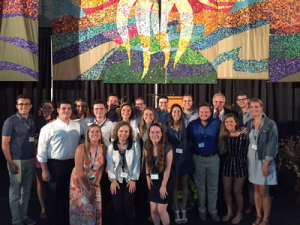An Advisor’s Reflection: “If you want peace, work for justice.”
“If you want peace, work for justice.”
This profound statement from Pope Paul VI has been a guiding force throughout my life.  The power of which was further emphasized to me while attending the 2016 National Jesuit Student Leadership Conference (NJSLC) at Regis University. This year’s gathering was appropriately themed “Peace by Piece.” Over 350 delegates, both student leaders and educators, from Jesuit universities convened to explore this extremely relevant and timely subject.
The power of which was further emphasized to me while attending the 2016 National Jesuit Student Leadership Conference (NJSLC) at Regis University. This year’s gathering was appropriately themed “Peace by Piece.” Over 350 delegates, both student leaders and educators, from Jesuit universities convened to explore this extremely relevant and timely subject.
In a nation and world that as of late, feels constantly broken by violent conflict, racial tensions and divisive political rhetoric, the concept of peace remains a mystery. At times, I myself personally struggle to process and make meaning of the negative news stories that dominate the media. Yet, it is also my responsibility as a higher education administrator to assist students in reflecting upon these events, helping them to reconcile the role they can play in addressing these injustices.
How does one work for justice? This conference provided space for a deeper dialogue about individual and community strengths that contribute to inner and external peace. It established a network of relationships across institutions where we learned how others are fighting for social justice. And finally, participants were challenged to insert themselves as a piece of the puzzle, by applying what they learned and committing to take action to help our world, which is so desperate for healing.
I found the closing keynote by Naomi Tutu, to be the most compelling piece of the entire gathering. During her remarks, Tutu utilized a garden as a metaphor for our world. As an avid gardener with a green thumb, this imagery deeply resonated with me. She stated that unless we spend intentional time seeking to learn and understand about the diversity and unique individuality of each part, we would never fully appreciate the beauty and interdependent nature of the whole garden. Tutu’s example aligned closely with our Jesuit value, Cura-personalis. As we promote care of the whole person, we strive to be attentive to the needs of each person, grounded-in their own story and in appreciation of their own gifts and talents. In doing so, we recognize and affirm the contributions we bring as individuals that enhance the overall community. The garden and our communities are therefore places where peace and justice should be sown first and foremost, through a deeper relationship and care for each other.
through a deeper relationship and care for each other.
NJSLC 2016 inspired another generation of young leaders in the Jesuit mission towards greater peace and justice within the context of our own communities and the world. I am excited to continue this tradition, bringing the event for the first time to Georgetown University in Summer 2017!
This article was written by Lisa Bennett, Assistant Director for Student Engagement at Georgetown University’s Office of Campus Ministry, for the Jesuit Association of Student Personnel Administrators (JASPA), a conference of the Association of Jesuit Colleges & Universities (AJCU). This article was published online on September 2nd, 2016. The original is available online here.
Lisa Bennett currently serves as the Assistant Director for Student Engagement in the Office of Campus Ministry at Georgetown University. In this role she advises the Campus Ministry Student Forum – an assembly responsible for supporting and advocating for the university’s faith-based student organizations. She also serves as an advisor of the 2017 NJSLC planning committee at Georgetown. Lisa holds a M.S. in Conflict Analysis and Resolution from GMU and a B.A. in Religion and History from JMU.